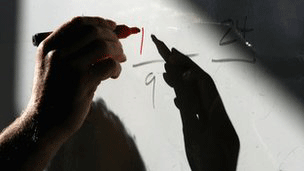BBC:Maths skills add up to higher earnings, study finds

How well children do at school and early reading skills are already widely known to be linked to higher earnings.
But researchers claim there is an especially strong link between early maths skills and future pay. They found children who were good at maths at 10 went on to earn 7% more at 30 than an "otherwise identical" child.
The government-funded study was carried out by the Institute for Fiscal Studies (IFS). One of the authors, Claire Crawford, said: "Our research shows that maths skills developed during primary school continue to matter for earnings 20-30 years down the line. "Moreover, they seem to matter more than reading skills, and over and above the qualifications that young people go on to obtain. This highlights the importance of investing in skills, particularly maths skills, early."
The researchers looked at data on children featured in the British Cohort Study - a large group of people born in April 1970 - to look at the link between reading and maths scores at age 10, and earnings at ages 30, 34 and 38. The children had all taken particular tests at 10. Maths lessons overhauled The researchers say that once they had taken in to account other factors which can affect educational achievement and earnings and the individuals' highest qualifications, there was a link between maths and pay. They confirmed reading skills at 10 were also important, but said this was less so than maths. Children who had the highest scores in reading at 10 went on to earn about 2% more per year than a similar child who had a middle-ranking score. The study's authors said they did not know why this was the case, but suggested employers seemed to value maths skills and were willing to reward them with higher wages. The government in England is overhauling the maths curriculum for primary schools. And it has said from September, teenagers will keep studying maths until they are 18 if they have not passed a GCSE in the subject at grade C or above. At primary school, it says there should be more emphasis on arithmetic and that some topics, such as the calculation of fractions, volume and area should be covered earlier. It is also banning calculators from national maths tests (known as Sats) taken by 11-year-olds. Schools Minister Elizabeth Truss said: "This research clearly shows why mastering the basics in maths at primary school is so important. "That's why our draft maths primary school curriculum focuses on raising standards in arithmetic, including efficient calculation methods such as long and short multiplication and division, and fractions."